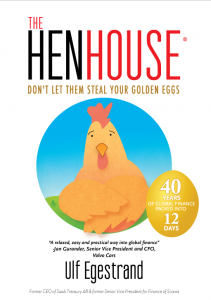Bloggen “Pengar är energi”
I denna blogg ”Pengar är energi” skriver jag om hur du blir mer effektiv med dina pengar och snabbare kan nå din ekonomiska frihet. Jag som skriver har själv gjort en ekonomisk resa: från vaktmäster i en bank till finansdirektör i ett globalt företag. Jag har även varit ordförande i en av världens mest framgångsrika hedgefonder som handlar i valutor. Jag har också privat förlorat större delen av min förmögenhet men kommit tillbaka och är sedan några år ekonomisk fri (det är vad jag kallar en äventyrlig resa). Nu gör jag det jag alltid velat göra: ge gemene man motivation och kunskap att hantera sina pengar och förverkliga sina drömmar. Jag skrivit boken The HenHouse (www.HenHouseworld.com) och håller föredrag om pengar och motivation.
Här kommer jag dela med mig av mina erfarenheter av att arbeta med finans, och av min personliga resa till ett liv i ekonomisk frihet. Med denna blogg hoppas jag att kunna inspirera fler till att skapa sig end god relation till sin ekonomi, och att nå större ekonomisk frihet.
Tillsammans med kognitionsvetaren Elin Helander, som skriver bloggen ”hjärnkoll på ditt sparande” på Nordnetbloggen kommer vi göra en dykning in i vad som krävs för att nå ekonomisk frihet – jag utifrån mina egna erfarenheter av en sådan resa, och hon från ett kognitionsvetenskapligt perspektiv, alltså hur vårt betende och tankar påverkar oss och hur vi kan samarbeta med vår hjärna för att lättare lyckas.
Blogg 1,
Välkomna till första inlägget i bloggen ”Pengar är energi”
Varför har vi vanor?
Svaret är enkelt. Genom att ha vanor så spar vi på energi. Här berättar Elin Helander om att goda vanor är vägen till en större ekonomisk frihet och hur du gör för att skapa dig de vanor du vill ha.
Jag kommer i detta inlägg dela med mig av 3 goda vanor som har tagit mig i rätt riktning till det liv jag lever idag.
3 vanor som leder till ekonomisk frihet
Jag vill dela med mig till dig 3 vanor som har gjort min resa till ekonomiska frihet möjlig. Dessa vanor är så enkla att du sparar pengar utan att egentligen behöva tänka så mycket på det. Och jag lovar dig att det kommer hjälpa dig att sova gott om nätterna.
1. Betala till dig själv först. Månaden ska börja med att ditt sparbelopp dras automatisk från bankkontot. Detta gör att du fokuserar på hur du ska kunna betala dina räkningar (istället för att fokusera på hur du ska kunna spara). Om pengarna inte räcker till räkningarna så blir din uppgift att ta reda på hur du kan minska utläggen eller öka inkomsten. Du får inte nagga på ditt sparande. Det är ju du som ska komma först.
2. Skriv ned alla dina utgifter på ett papper eller i datorn under 6 månader. Lägg de sedan månadsvis i olika kategorier som boende, el, mobil, mat, kläder, nöjen, etc. Då vet du vart pengarna verkligen går. Först när du har gjort detta kan du sätta upp mål för var du kan minska dina utlägg. Följ sedan upp och om du gör detta till en vana.
3. Mitt sista tips handlar om inköp. Sätt 30 % lägre budget än du har råd med på stora inköp. Här kan du spara många sömnlösa nätter (och mycket pengar). Ta det största och viktigaste köpet av alla i livet – bostaden. Denna kostnad är den största du har och som du är mest känslig för vid förändringar som långvarig sjukdom, arbetslöshet eller brusten prisbubbla. Om du t.ex. har råd med 1.500.000 kr för ett husköp, säg då till dig själv och mäklaren att huset får kosta max 1.000.000 kr. Du kommer med all sannolik att betala mer än du hade tänkt dig. Fråga någon som har köpt bostad.
Lycka till/Ulf


 English
English  Svenska
Svenska 


